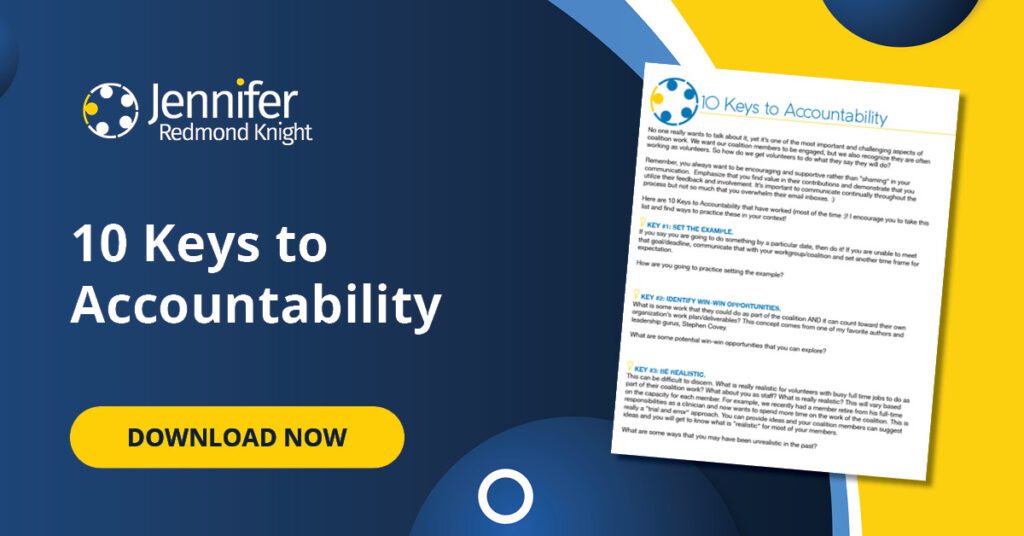Let’s face it. It is really easy to say “yes” in our coalition work but holding ourselves, our leaders and our members accountable is challenging. It’s not that we don’t want to follow through, it’s just that there are so many different things to do. And as we just finished our series on Escape the Overwhelm, it’s a great time to talk about accountability. Join me this week as I highlight 10 Keys to Accountability that have worked – most of the time 🙂!
#1 Set the example
When we set the example for accountability, we demonstrate integrity and build trust. If we are asking everyone else to be accountable, we have to do it too! When it’s difficult for you to follow through, be honest about it. Let your coalition know that you are behind on a deadline or need more time. This sets an important example of open and honest communication.
#2 Identify win-win opportunities
One of the BEST ways to get your coalition members to be accountable is to ask them to do things that align with their own organizational or personal goals. Who doesn’t want to do one thing that checks off two boxes?!
#3 Be realistic
Most of our coalition leaders and members are working as volunteers in the coalition. When we practice being realistic with our expectations, it is much easier for our coalition to do what they say they are going to do. If we are asking a coalition member to do something a staff member usually does, it is unlikely they will have the capacity to follow-through.
#4 Set a deadline
We all work on deadlines. If we are asking our coalition team to do something without a date attached, it becomes much more difficult for them to prioritize it. By setting a deadline, that still gives you a little time to follow-up if they don’t meet it. It also supports accountability.
#5 Send individual emails
One of the most powerful ways to connect with people is to send one-on-one emails. When we get group emails, it is easy to assume that someone else in the group is taking care of it. When you send an email (even if you copy/paste most of it) to an individual, you make it more personal. When it’s more personal, people are more likely to respond.
#6 Send out your meeting agenda a week in advance
When you share your agenda ahead of time, it prompts your members (and you!) to work on any projects or activities that they may not have finished yet. If you include specific names in the agenda, that helps even more! 🙂 This also contributes to a more effective meeting.
#7 Start your meetings with action items from the previous meeting
When you do this, you build momentum for the work and support accountability. If you practice this for each of the meetings you lead, then it creates a culture of both action and follow-through.
#8 Put decisions made and action items toward the beginning of your meeting notes
How many people actually read all of the meeting notes? If we start our meeting notes with decisions made and action items (with who is responsible), then it is more likely that our coalition members will read the first page.
#9 Include action items and names in the body of the email
As much as we plan to open the attachment in the email, how many times does it just get buried in our inboxes? By including the first page of the meeting notes in the body of the email, it is much more likely that folks will read it. When they read it, they can take action on it!
#10 Keep moving forward even if not everyone contributes
When we set the expectation that we are moving forward even if we haven’t heard from everyone, it helps folks contribute. They may not make this deadline, but when they find out you are not waiting on them, “FOMO” (fear of missing out) sets in and they will contribute next time.
So what about you? Which of these keys do you want to try right now?
Check out my latest free resource that walks you through practical ways to apply each of these 10 Keys to Accountability!
Photo by Andrea Tummons on Unsplash

